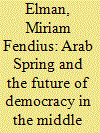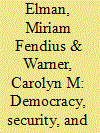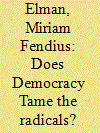|
|
|
Sort Order |
|
|
|
Items / Page
|
|
|
|
|
|
|
| Srl | Item |
| 1 |
ID:
111732


|
|
|
|
|
| Publication |
2012.
|
| Summary/Abstract |
The success of the Arab Spring depends on new governments being able to meet youth's economic expectations, and Israel could still contribute to a new regional conversation on economic and social reform.
|
|
|
|
|
|
|
|
|
|
|
|
|
|
|
|
| 2 |
ID:
081028


|
|
|
|
|
| Publication |
2008.
|
| Summary/Abstract |
This article analyzes the effects of democracy on religious political parties. Using a comparative and cross-regional approach, we argue that religious political parties in democracies can be "tamed" with access to patronage, power, and policy. While democracy tends to have a moderating influence, we identify the conditions and circumstances under which extremism may not be quelled merely by the party's participation in the government. The article briefly considers the arguments - both pro and con - that have emerged in recent debates over the intersection of religion, security, and democracy. The article then provides a framework for assessing the impact of democracy on religious political parties, and considers how these dynamics play out in the Asian region. In addressing the question "does democracy tame the radicals?" it is important to study Asia because it offers a set of varied democratic institutions; demonstrates different ways of adjudicating religion, the state, and secularism; and includes a diverse set of religious political parties espousing both moderate and radical political platforms. The article concludes with an overview of the Forum essays, which analyze democracy, security, and religious political parties in India, Indonesia, Italy and Israel.
|
|
|
|
|
|
|
|
|
|
|
|
|
|
|
|
| 3 |
ID:
081050


|
|
|
|
|
| Publication |
2008.
|
| Summary/Abstract |
This article considers how participation in the democratic political process influences the platforms and strategies of Israel's Jewish religious political parties. Focusing on the religious political parties that contested the March 2006 election in Israel, the article suggests that party ideology strongly influences the extent to which Israel's religious political parties have taken up moderate positions regarding Israel's internal and external security policies, especially with regard to religion and state issues; the Israeli-Palestinian conflict; and Israel's withdrawal from the post-1967 occupied territories. Ideology, however, is not determinative - regular participation in the electoral process and access to government resources has over time also worked to moderate initially hardline party positions. The fact that religious political parties typically serve as pivotal parties in Israel's governing coalitions accounts for why these parties, and their constituents, have largely avoided extremism. As a result of the integration of religious political parties into Israel's proportional representation, multi-party system, extremist violence in Israel has tended to be extra-parliamentary
|
|
|
|
|
|
|
|
|
|
|
|
|
|
|
|
|
|
|
|
|